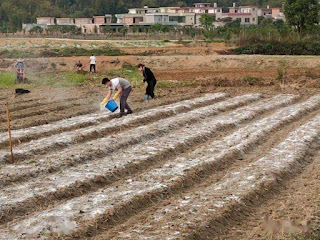Chinese officials are locking down millions of people to prevent the latest spread of the covid-19 virus, but they need to make exceptions for hundreds of millions of farmers dispersing to their fields to plough, seed and fertilize their crops this spring.
During March, China had nearly 104,000 covid-19 infections detected in 29 of the country's 31 provinces, according to China's National Health Commission. The cases are widely spread and occurring frequently, prompting stronger virus prevention and control lockdowns and mass-testing. The highly contagious Omicron variant makes the virus situation "severe and complicated," the commission said.
The conflict between epidemic control and spring farm work has come to the fore in Jilin Province, one of the two primary case clusters (Shanghai is the other) and a northeastern province that is one of the country's top suppliers of corn.
 |
| Spring field work in China |
Jilin Provincial Governor Han Jun held an April 1 video conference where he stressed that virus control and spring panting are both at a critical stage and must both be considered priorities. The main concern voiced at the meeting was that rural people may be locked down in quarantines at urban work sites or their village homes--preventing them from returning to their fields to plough, plant seeds, fertilize and conduct other field work. Governor Han--a long-time rural policy advisor in Beijing before being posted to Jilin--called for measures to ensure that farming tasks are not delayed by a single day, that no household is left behind, and that not a single plot of land is left idle.
The Ministry of Agriculture and Rural Affairs sent a team to Jilin Province headed by the chief veterinarian to coordinate the spring cultivation and virus prevention work.
Four categories of tasks are planned for spring planting in Jilin:
- Organize the return of farmers to the countryside for farm work under a closed-loop management system, with family units carrying out work while maintaining distance from other families.
- Organize farmers cooperatives, service-providing organizations, and other new types of farm operations to cultivate and seed fields, transplant seedlings and control pests on behalf of rural families.
- Unblock distribution channels for agricultural inputs such as seed, fertilizer, and pesticide. Open "green channels" eligible for reduced tolls and fees and expedited transportation to suppliers and shops.
- Ensure that operators supplying mechanized ploughing and seeding services are able to travel around the countryside to serve fields in various regions.
 |
| Advising a farmer about spring farm work |
 |
| Government officials do their part for spring planting, posing for the camera. |



No comments:
Post a Comment